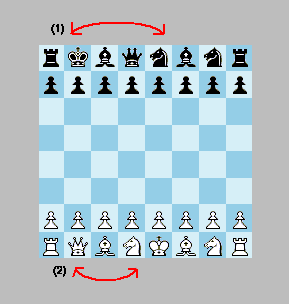External Link: Relocation Chess
 One can, by a procedure of
relocation, easily reconfigure the initial array according to the
players' choice, thus, arguably, making the Fischer randomization procedure redundant. This also answers to the chessplayer's predilection for remaining in control. Rules:
One can, by a procedure of
relocation, easily reconfigure the initial array according to the
players' choice, thus, arguably, making the Fischer randomization procedure redundant. This also answers to the chessplayer's predilection for remaining in control. Rules:
The players can, before play begins, swap places of the king/queen and another piece except the rooks. Thus, if the king is swapped (relocated), the other piece (the relocatee) ends up on the king's square. If the queen is swapped, the relocatee ends up on the queen's square. One restriction is that the bishops mustn't end up on the same square colour. Note that black begins by making the initial swap. Alternatively he can choose to leave the position as it is. The white player then has the option to relocate his king or queen, whereupon he starts the game by making the first move. Note that the king retains his castling rights even if it has been relocated. The castling rules derive from Fischer Random Chess.
With these relocation rules the rooks remain in their natural positions, and the bishops are always positioned so that there is still a choice to develop them on either of the queen's or the king's wing. This maintains the strategical ambiguity of the initial position, while sound positions are produced where no definitive advantage can be obtained. Black relocates first. Thusly white gets a chance to make a strategical decision and create an initiative, as in the standard position. Although the initial positions are, as such, a subgroup of Fischer Random, the two parties may choose different setups.
Note that there is also a randomized version of this variant, named Chess64.
A Zillions
 program and more information is here.
program and more information is here.External Link: http://www.two-paths.com/bg/relocationchess.htm
 This 'user submitted' page is a collaboration between the posting user and the Chess Variant Pages. Registered contributors to the Chess Variant Pages have the ability to post their own works, subject to review and editing by the Chess Variant Pages Editorial Staff.
This 'user submitted' page is a collaboration between the posting user and the Chess Variant Pages. Registered contributors to the Chess Variant Pages have the ability to post their own works, subject to review and editing by the Chess Variant Pages Editorial Staff.
By M Winther.
Web page created: 2009-04-23. Web page last updated: 2009-04-23
